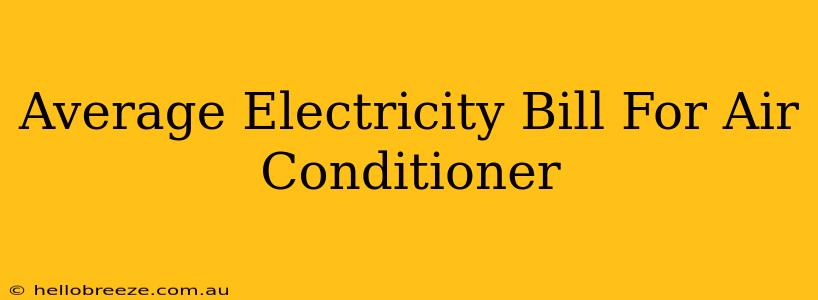Are you curious about how much you'll be paying monthly for your air conditioner's electricity consumption? Understanding your average electricity bill for an air conditioner is crucial for budgeting and making informed decisions about energy efficiency. This comprehensive guide will break down the factors influencing your AC electricity costs and provide you with tips to minimize your expenses.
Factors Affecting Your Air Conditioner's Electricity Bill
Several key factors determine the ultimate cost of running your air conditioner. Understanding these will help you accurately estimate your monthly bill and potentially reduce your energy consumption.
1. Air Conditioner Size and Type:
The size (BTU rating) of your air conditioner directly impacts its energy consumption. A unit that's too large will cycle on and off frequently, wasting energy. Conversely, an undersized unit will struggle to cool your space effectively, running constantly and increasing your electricity bill. The type of AC also matters:
- Window units: Generally less efficient than central AC systems.
- Central air conditioners: Offer more even cooling but require more energy overall.
- Mini-split systems: Known for their efficiency and zoning capabilities, offering more control over cooling individual rooms.
- Portable AC units: Convenient but often less energy efficient than other options.
Choosing the right size and type of AC for your space is paramount for minimizing energy costs.
2. SEER Rating:
The Seasonal Energy Efficiency Ratio (SEER) rating indicates how efficiently your air conditioner converts electricity into cooling power. A higher SEER rating means lower energy consumption and lower electricity bills. Look for units with a high SEER rating (15 or higher is generally considered efficient).
3. Usage:
The more you use your air conditioner, the higher your electricity bill will be. Factors influencing usage include:
- Climate: Hotter climates naturally require more AC usage.
- Home insulation: Poor insulation allows cool air to escape, forcing your AC to work harder.
- Window sealing: Leaky windows and doors let conditioned air out, increasing energy consumption.
- Number of occupants: More people in the home generate more heat, leading to increased AC use.
- Appliance usage: Other heat-producing appliances (ovens, stoves) can impact the load on your AC.
4. Electricity Prices:
Your electricity provider's rates significantly influence your total cost. Electricity prices fluctuate regionally and seasonally.
5. Maintenance:
Regular maintenance, including cleaning filters, coils, and checking refrigerant levels, is crucial for optimal AC performance and energy efficiency. Neglecting maintenance can lead to increased energy consumption and higher electricity bills.
Estimating Your Average Electricity Bill
Estimating your average bill requires consideration of the factors above. While a precise figure is difficult to provide without specific details about your setup, here's a general approach:
- Determine your AC's wattage: This information is usually found on the unit's label.
- Calculate daily kilowatt-hour (kWh) usage: (Wattage / 1000) x hours of daily use.
- Calculate monthly kWh usage: Daily kWh usage x 30 days.
- Multiply by your electricity rate: Monthly kWh usage x your electricity cost per kWh.
This calculation provides a rough estimate. Your actual bill might vary based on the factors discussed earlier.
Tips for Lowering Your AC Electricity Bill
- Improve home insulation: Proper insulation reduces the strain on your AC.
- Seal windows and doors: Prevent cool air from escaping.
- Use window coverings: Keep sunlight out during the day.
- Programmable thermostat: Set it to automatically adjust temperatures when you're away or asleep.
- Regular maintenance: Keep your AC clean and well-maintained.
- Consider energy-efficient upgrades: Explore options like smart thermostats or more efficient AC units.
By understanding these factors and implementing energy-saving strategies, you can effectively manage your average electricity bill for your air conditioner and create a more comfortable and cost-effective home environment. Remember, consulting with a qualified HVAC professional can provide personalized advice and solutions for your specific needs.

